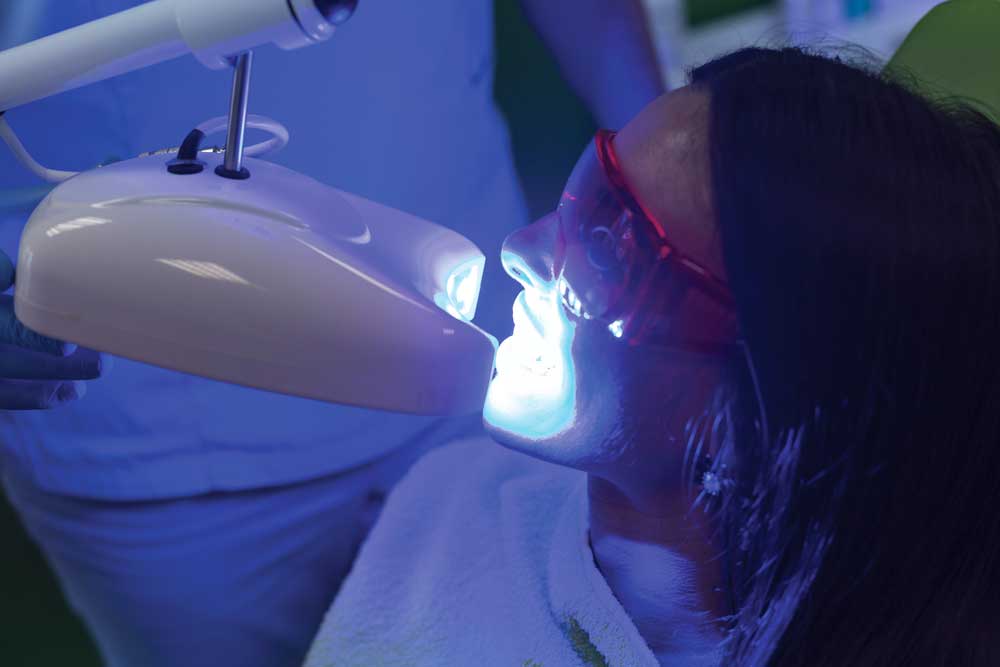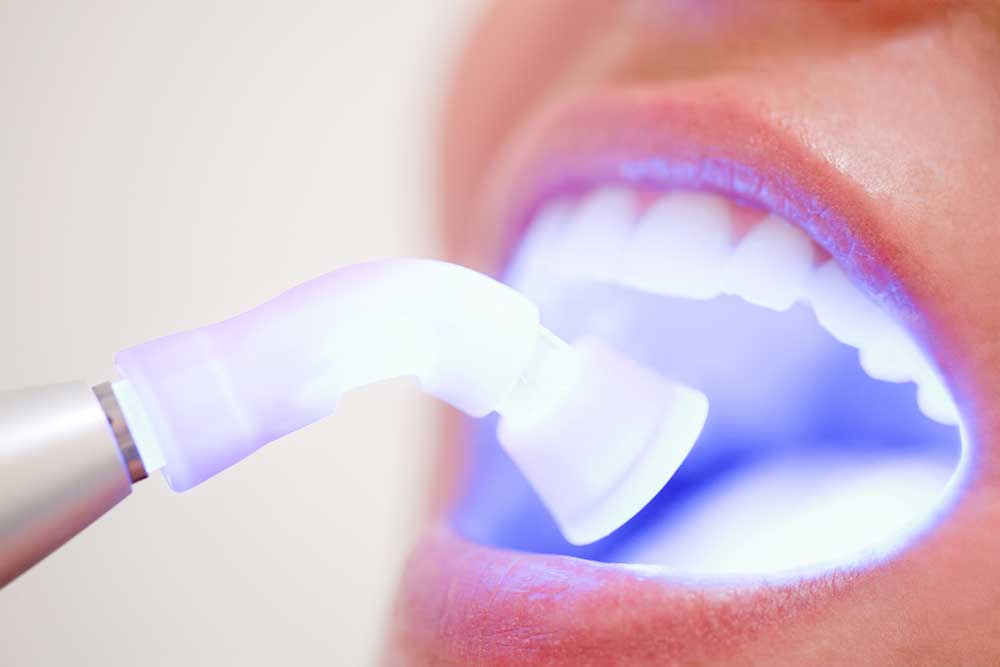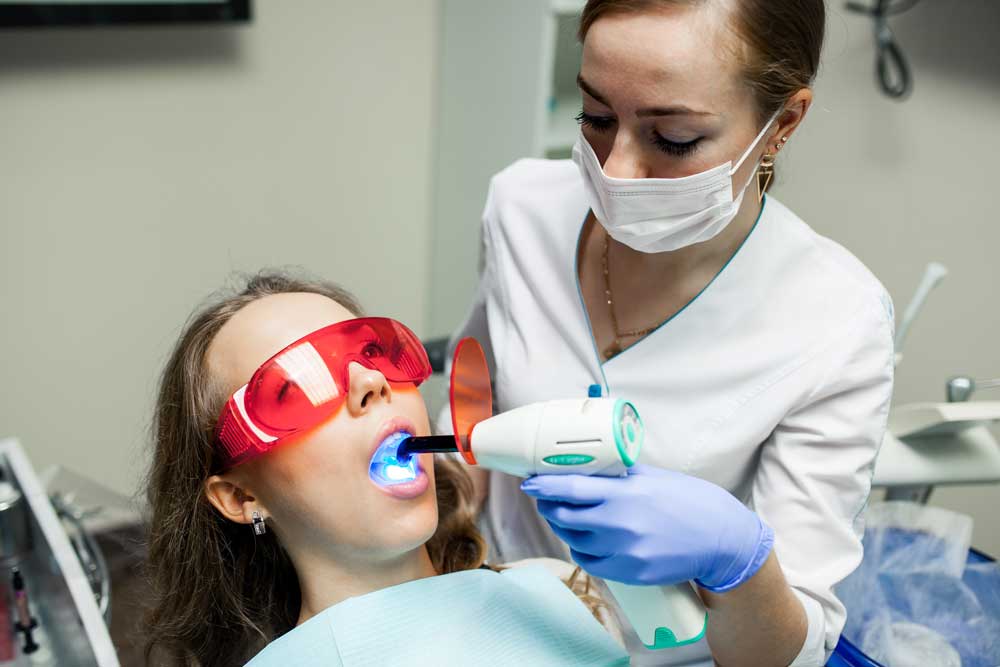The Science Behind Teeth Whitening
A fact of the modern world is that people want white teeth. Those with white smiles are considered more attractive, more presentable, and often have a greater sense of confidence and self-esteem Knowing this, it’s no wonder why more and more people are seeking teeth whitening treatments. For many people, it seems like a quick solution to a problem that may be causing a great hinderance on their life. Yet, few people know how it works. If you are looking for the best teeth whitening options for you, then this article is a good place for you to start.
Treatments Today
Tooth discoloration occurs due to a discoloration of the molecules in the dentin, caused by food, alcohol, tobacco, age or genetics. Tere are a number of treatments available, helping us to achieve a whiter, brighter smile.
Hydrogen and Carbamide Peroxide
 Modern teeth whitening generally focuses on a concentration of hydrogen or carbamide peroxide making its way throughthe enamel naturally, rather than being forced through with the aid of a corrosive agent. Hydrogen and carbamide peroxide are variations of the same chemical. Hydrogen peroxide is the simplest form of peroxide, and is used as an oxidiser, bleaching agent, and antiseptic. Carbamide peroxide blends hydrogen peroxide with urea, which is a compound formed in the liver from ammonia When applied in a solution that is often left to rest and/or cured with the aid of a curing light, the peroxide solutions penetrate the enamel through to the dentin, where over time the peroxide molecules break apart the discoloured dentin molecules, resulting in whiter teeth.
Modern teeth whitening generally focuses on a concentration of hydrogen or carbamide peroxide making its way throughthe enamel naturally, rather than being forced through with the aid of a corrosive agent. Hydrogen and carbamide peroxide are variations of the same chemical. Hydrogen peroxide is the simplest form of peroxide, and is used as an oxidiser, bleaching agent, and antiseptic. Carbamide peroxide blends hydrogen peroxide with urea, which is a compound formed in the liver from ammonia When applied in a solution that is often left to rest and/or cured with the aid of a curing light, the peroxide solutions penetrate the enamel through to the dentin, where over time the peroxide molecules break apart the discoloured dentin molecules, resulting in whiter teeth.
Toothpastes
Over-the-counter methods of tooth whitening include toothpastes, which are purely abrasive, and only whiten the teeth rather than bleaching them internally. Some gels are also recommended by dentists, and often achieve results comparable to that of whitening strips.
Mouthwashes
Mouthwashes are a common hygiene solution with antibacterial properties. However, there are some mouthwashes designed to whiten teeth, as well as kill bacteria. These mouthwashes contain a small amount of peroxide. They aren’t believed to be highly effective as the solution is only in the mouth for about 60 seconds, but over time the effects can be cumulative.
Trays
The trays were invented back in the 1960s-1970s are still used today, though dentists recommend getting a custom-made tray for teeth whitening, the same sort of process as getting a mouthguard moulded. . Even though many pre-fabricated trays exist on pharmacy shelves, they often won’t fit your mouth properly, causing the peroxide solution to ooze out and cause damage to your gums and other parts of your mouth.
Strips
Strips are one of the most popular methods of teeth whitening and involve applying a plastic strip coated in peroxide onto your teeth for 30 minutes a day for 2 weeks, with results lasting for about 4 hours.
Treatments Available At Dental Clinics
 Some people feel too much hesitation regarding at-home procedures, however, and prefer to have teeth whitening done in person by a professional cosmetic dentist. In this instance there are several options available.
Some people feel too much hesitation regarding at-home procedures, however, and prefer to have teeth whitening done in person by a professional cosmetic dentist. In this instance there are several options available.
Phillips
Phillips Zoom!®, BriteSmile® and Opalescence® all utilise similar methods, whereby a peroxide solution is applied to the teeth and then put under a blue light to stimulate the whitening process. The main difference comes in the gels used. The Zoom! method uses a gel with 25% peroxide. BriteSmile is much less corrosive, with only 15% peroxide in the gel. The BriteSmile procedure takes an hour and the gel is applied 3 times over the course of the treatment. Opalescence uses a gel with 40% peroxide, but the solution also contains potassium to reduce sensitivity and fluoride to strengthen the enamel.
DenMat
LumiBrite by DenMat® uses a whitening gel with a curing light and whitening light. No harmful UV rays are used in this procedure, and the gel can work without the light. A specially manufactured LumiBrite desensitising gel further helps with discomfort during the procedure.
GLO
There is also GLO Science Professional. GLO stands for “Guided Light Optics” and involves using a mouthpiece with a whitening gel. The mouthpieces deliver heat and light, preventing oxygen escaping, and maximises the gel strength. However, due to the heat, the teeth do dry out, which can cause damage to the enamel.
KöR
Another option is KöR Whitening Deep Bleaching™. While it utilises much the same procedure, it is famous for targeting both external and internal stains. And although it is significantly more expensive than other teeth whitening costs and treatment methods, its results are permanent, making it a life-long investment.
Call ProSmiles Complete Health Dentistry Today!
If you’re looking for teeth whitening, feel free to call ProSmiles Complete Health Dentistry on (03) 9417 6355 or email us on info@prosmiles.com.au We will more than happily answer any questions you may have regarding your treatment.
